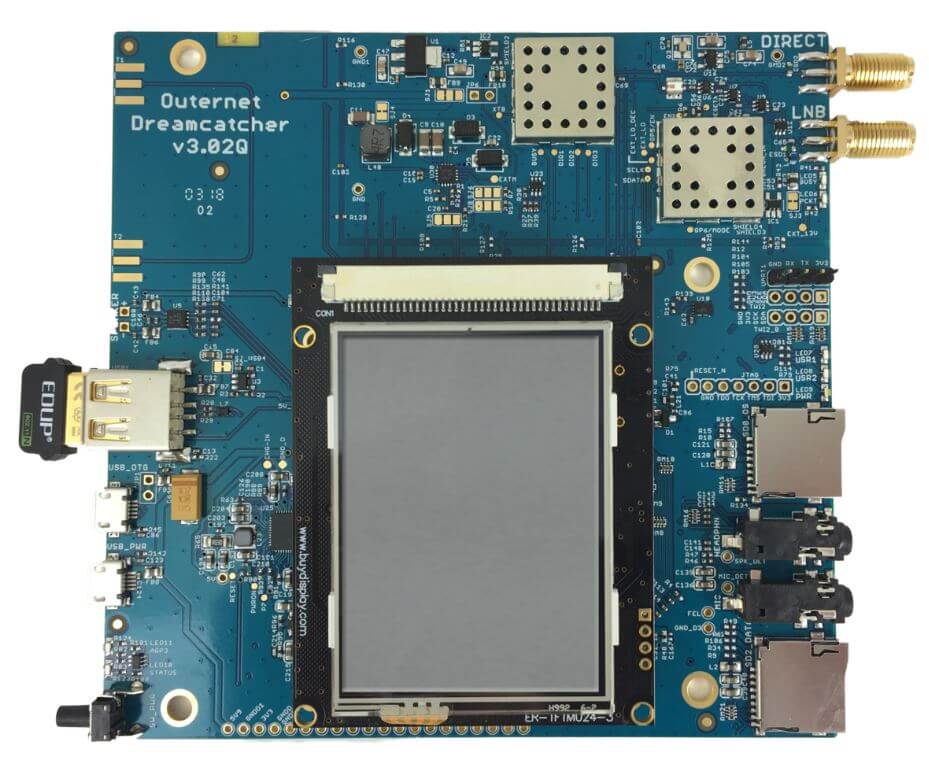Othernet (formerly Outernet) Updates Lantern Backers
Othernet (formerly known as Outernet) are a providers of a free data service broadcast from satellites. They hope to build a system and low cost satellite receiver products where people can easily stream free daily data such as news, videos, books, and live audio down to a computer or phone from anywhere in the world via a device called a Lantern. It is a one way download only service, but may be useful for those in areas with limited internet, disaster preppers, or people in countries with internet censorship. The describe their mission as:
Othernet's mission is to build a universal information service; a truly pervasive multi-media service that operates in the most remote places and functions even when nothing else does.
In the past they ran a trial service on L-band satellite frequencies and used RTL-SDR dongles as the receiver. They have since discontinued that service in favor of a new Ku-band LoRa based service which can provide much more data - up to 200MB a day. The update released today was sent to Lantern backers, which was the receiver they crowdfunded for in their Kickstarter back in 2014. The update notes that the final iteration of the Lantern is close to being ready.
Broadcasting Khan Academy 24/7
Hello Backers,
Yes, we are still here. It’s been a long while since the last update, but that does not mean we have stopped–or even slowed–working on Lantern. We have been making progress, though it has been much, much slower than what everyone wants. Fortunately, we are in the final stage of development.
The last update described the new network technology we had developed. Our original goal was to broadcast 20 MB of content per day, which is what we were doing with our previous network. The new system is operating at 10-times that speed, which is a little over 20kbps and 200 MB of content per day. Some of the work we’ve been doing over the past few months is related to tripling our current download speeds. Our target is 60kbps, which results in over 600 MB per day. The size of the device will be similar to a standard flashlight.
At our current download speed of 20kbps, we are broadcasting both data and a 24/7 audio stream. I know many of you were interested in the educational applications that were highlighted during the campaign, which is why I’m very pleased to share that we are currently broadcasting the entirety of Khan Academy as a 24/7 audio stream. The Khan Academy library consists of over 900 separate lectures, which we’ve turned into a giant audio playlist. Now we just need to get Lanterns into everyone’s hands.
The next update will include a picture of our final antenna design. The antenna that is currently included in our DIY kit is 2-inches/5-cm across and the shape of a cone. We are trying to flatten the cone and also increase the size to about 4-inches/10-cm, which is what allows for greater download speeds. Since we are operating at microwave frequencies (12 GHz), both the design of the antenna and the parts to convert the high frequency to a lower one are pretty tricky. Microwave engineering is widely considered black magic, which is the main reason for the long break since the last update. We are close to turning the corner and are targeting the end of the year for our initial production run.
Unrelated to our technical work is our recent name change. We had been fighting a trademark issue for the past four years. We recently decided that it made more financial sense to change our name, rather than continue spending legal fees to defend our position. We are now Othernet (http://othernet.is). This name change does not mean we are going away, nor does it mean we are not delivering Lanterns. It’s just a legal hiccup.
Thanks for your patience and support while we get through the final stage of building what you all backed several years ago. I know it’s been a long time and we are making every possible effort to deliver something that exceeds everyone’s original expectations. Although it’s taking three times longer to develop and ship the product, what we now have will be ten-times more useful.
